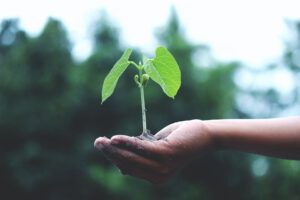
Last week I visited Germany for my study around the climate crisis and the issue of hope. One German student said: Can’t we as teachers just tell students to become vegetarians to save the planet?
What do you think, would it be a solution, or wise, to tell students what to eat, drink, vote, do or think in order to bring about change? I mean, shouldn’t we do something as we know that studies about the effects of climate change on young people reveal that pessimism, guilt, hopelessness and fear are common in the new generation?
Bringing about change in times of the many present day crises with all the doom stories and anxiety is an interesting, yet challenging research topic. Interestingly, precisely in the midst of complex crises, those who provide education have a crucial role: to make the new generation appear to the world as powerful and innovative (Arendt, 1958). To not reinforce fear or impose what to do or think, but have the new generation discover from hope that a different future is possible and that even a crisis includes profound problems-though complex and intractable- for which solutions can be found. A focus on hope is key!
Hope as a construct has received attention from many different angles, such as psychology, theology, philosophy and recently even famous primatologist and anthropologist Jane Goodall (2021). Yet, although many authors endorse the need and importance of hope, to date there has been little innovation in the ways in which hope can have a practical impact and lead to change, let alone in education. In my research project, hope has been incorporated into a pedagogy of hope. It holds several powerful design principles for a pedagogy of hope stemming from pilots in teacher education institutes in both the Netherlands and Germany and is now tested in the context of the climate crisis. Around this climate crisis, pre-service teachers are known to feel very committed to teaching the topic, but at the same time concerned and anxious about the climate themselves and ignorant in how to provide hopeful and effective teaching about the climate crisis in their secondary school internship classes (Bean, 2016).
The pedagogy of hope was implemented in a Dutch and German teacher education institute. The preliminary outcomes show that participants were able to formulate specific intentions that are both directed toward hope for the climate as well as easy to implement in their actual teaching in secondary education. Also, many intentions show to be action-oriented and participants often used their creativity to find non-traditional ways of conveying climate hope. We also found hindrances for teaching hopefully, such as not enough time, curriculum coverage and a lacking attention in textbooks for climate change and climate hope. Also, the different opinions that others could have could make it a controversial issue to teach in school.
On to the next steps!
Michiel Dam, researcher at ICLON, LTA teaching fellow
Hoopvol klimaatonderwijs – Universiteit Leiden
Vijf nieuwe Teaching Fellows benoemd – Universiteit Leiden
References
Arendt, H. (1958). The crisis in education. In H. Arendt (Ed.), Between the past and present. (pp. 101-124). Leuven/Apeldoorn: Garant.
Bean, H. J. (2016). Pre-Service Teachers and Climate Change: A Stalemate? Australian Journal of Teacher Education, 41(4).
Goodall, J. & Abrams, D. (2021). The Book of Hope: A Survival Guide for Trying Times. Celadon books: New York city, New York.


Recent Comments